I am passionate about integrating emerging technologies, such as Virtual Reality (VR) and Artificial Intelligence (AI), into language teaching and learning. My journey in this field began with a comprehensive literature review on the application of VR in language education, which led to the co-authorship of three influential conceptual papers with my advisor, Dr. Lowell. The first paper explores the history of VR in foreign language education, highlighting its evolution and potential. The second paper is a chapter detailing methods to facilitate foreign language conversation simulations in VR for authentic learning experiences. The third paper delves into the design of immersive virtual reality (IVR) learning environments using systems thinking principles.
Through the process of writing these papers and the chapter, we identified a significant research gap: the lack of consideration for pedagogy and VR affordances in designing effective learning activities within VR environments. To address this gap, I initiated a research project titled “Impact of Virtual Reality on Developing EFL Learners’ English Conversational Skills for Situated Learning.” This project, registered under IRB number IRB-2023-597, aims to investigate how VR can enhance English as a Foreign Language (EFL) learners’ conversational skills in authentic, immersive settings. This research underscores my commitment to advancing the field of language education through innovative technology.
This project is design-based research. It put forward and implemented three design principles grounded in task-based language teaching (TBLT) pedagogy, focusing on two key VR affordances—authenticity and interaction—to develop task-based role-play speaking activities that were put into practice in a workshop series offered to undergraduate Chinese students interested in improving their English speaking. Sixteen Chinese undergraduate students engaged in the workshop series, completing eight tasks over eight sessions within a VR application called Immerse. Data from semi-structured interviews were thematically analyzed to explore how the design of the speaking activities supported English foreign language (EFL) learners in enhancing their speaking proficiency within VR environments. The design principles created and implemented in this design case study can serve as guidelines for designing and assessing speaking activities in VR environments, ensuring that educational practices are pedagogically sound and technologically enhanced. The findings from this research will be published in a paper titled Design and Evaluation of Task-Based Role-Play Speaking Activities in a VR Environment for Authentic Learning: A Design-Based Research Approach in the Journal of Applied Instructional Design.
In addition to developing three design principles and evaluating their effectiveness through qualitative data, the research project also investigated the impact of VR-enhanced instruction on EFL learners’ speaking skills and their perception of the learning experience within the context of situated learning, employing an explanatory mixed-method approach. The study utilized various instruments, including pretests and posttests that assessed comprehension, pronunciation, fluency, grammar, and vocabulary. Participants also completed a presurvey to gather demographic information and a postsurvey to assess their overall perception of the VR learning experience. Semi-structured interviews were conducted to gain deeper insights.
In addition to the aforementioned project I initiated, I am actively involved in several other initiatives. One significant project I contribute to is titled “Professional Development for Educators: Enhancing Instruction with Extended Reality Experiences for Enhanced Learning Opportunities.” In this role, I played a key part in designing workshop content and facilitating VR learning experiences. Furthermore, I collaborate with Belle Li and Dr. Lowell on a project exploring self-directed learning with generative AI, where I assist in data collection and analysis. Additionally, I participate in the project “Design-Based Research in a Non-Credit Competency Based Course (Ti-BOT),” led by Dr. Adrie and Dr. Richardson. My responsibilities in this project include research design, interview protocol development, data collection, analysis, and manuscript writing. I also participated in a project titled “Exploring Relationships between Undergraduate Students Metacognition, Presence, and Engagement in Online Community of Inquiry” with Dr. Larisa Olesova and Dr. Ayesha Sadaf and I am responsible for quantitative data analysis.
During my learning process, I have developed several key skills essential for academic and research excellence. I have mastered the art of writing literature reviews and research study proposals, as well as preparing Institutional Review Board (IRB) proposals. Additionally, I have gained extensive experience in conducting both qualitative and quantitative data analyses.
I have had the privilege of presenting my research findings at various conferences. Notably, I presented at the ASGERS student conference at Purdue, as well as at international conferences such as the Association for Educational Communications and Technology (AECT) and the American Educational Research Association (AERA).
Beyond presenting, I have also contributed to the academic community through my volunteer work. I served as a conference proposal reviewer and facilitator for AECT 2023 and as an Ad-hoc Reviewer for the journal of Virtual Reality.
For more details, please see the attached documents.
Literature Review
AERA Proposal
IRB Protocol
Spenser Grant Proposal
Conference Presentations
1. Lowell, V. L., & Yan, W. (2024). Applying systems thinking for designing immersive virtual reality learning experiences in education. AECT, Kansas City, Missouri.
2. Yan, W., & Lowell, V.L. (2024). Designing EFL speaking activities with the first principles of instruction and VR features for authentic learning. AECT, Kansas City, Missouri.
3. Yan, W., & Lowell, V.L. (2024). Impact of EFL learners’ perceptions of VR and attitude toward VR on developing speaking skills. AECT, Kansas City, Missouri.
4. Koehler, A. A., Richardson, J.C., Ilobinso, A., Ramoutar, S. Babalola, E, Baydar, S, Dong, L., Dufault, K., Farrington, S. Hsieh, C-J., Kotangale, A. Melik Tangiyev, D., Song, J., Tavakoli, J., Vilarinho Rezende Pereira, D., White, S., Yan, W., Yu, W, & Zhang, Y. (2024). Preparing pre-service teachers for blended and online environments using a competency-based approach. AECT, Kansas City, Missouri.
5. Yan, W., & Lowell, V.L. (2024). Exploring the impact of virtual reality on developing EFL learners’ speaking skills in situated learning. AERA, Philadelphia, Pennsylvania.
6. Yan, W., & Lowell, V.L. (2023). Impact of virtual reality on developing prospective teaching assistants’ conversational English. AECT, Orlando, Florida.
7. Lowell, V. L., & Yan, W. (2023). Bridging the XR technology-to-practice gap: XR presence, communication, and engagement – Chapter: Facilitating foreign language conversation simulations in virtual reality for authentic learning. Society for Information Technology & Teacher Education (SITE), New Orleans, LA., United States.
8. Lowell, V. L., Urena-Rodriguez, L., & Yan, W. (2022). Impact of authenticity of peer feedback in digital learning spaces on English public speaking self-efficacy and learning outcomes. AECT, Las Vegas, NV., United States.
9. Urena-Rodriguez, L., Lowell, V. L., & Yan, W. (2022). Self-efficacy and English language performance: A comparison between Facebook and Brightspace for peer-feedback activities. AECT, Las Vegas, NV., United States.
10. Yan, W. (2022). Effect of VR-assisted instruction on EFL learners’ speaking self-efficacy. Annual Graduate Student Education Research Symposium, Purdue University, West Lafayette, IN.
11. Yan, W. (2022). Design thinking in developing an online summary writing course for expository essays based on the ADDIE Model for college students. AECT Summer Symposium, Indiana University, Bloomington.
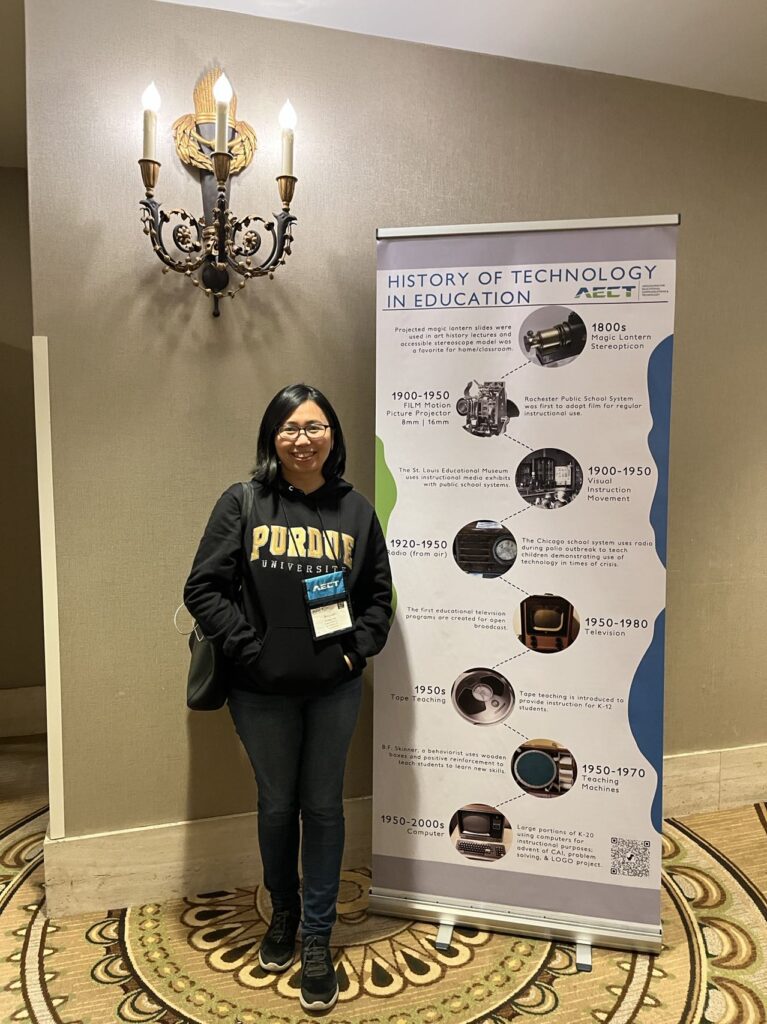
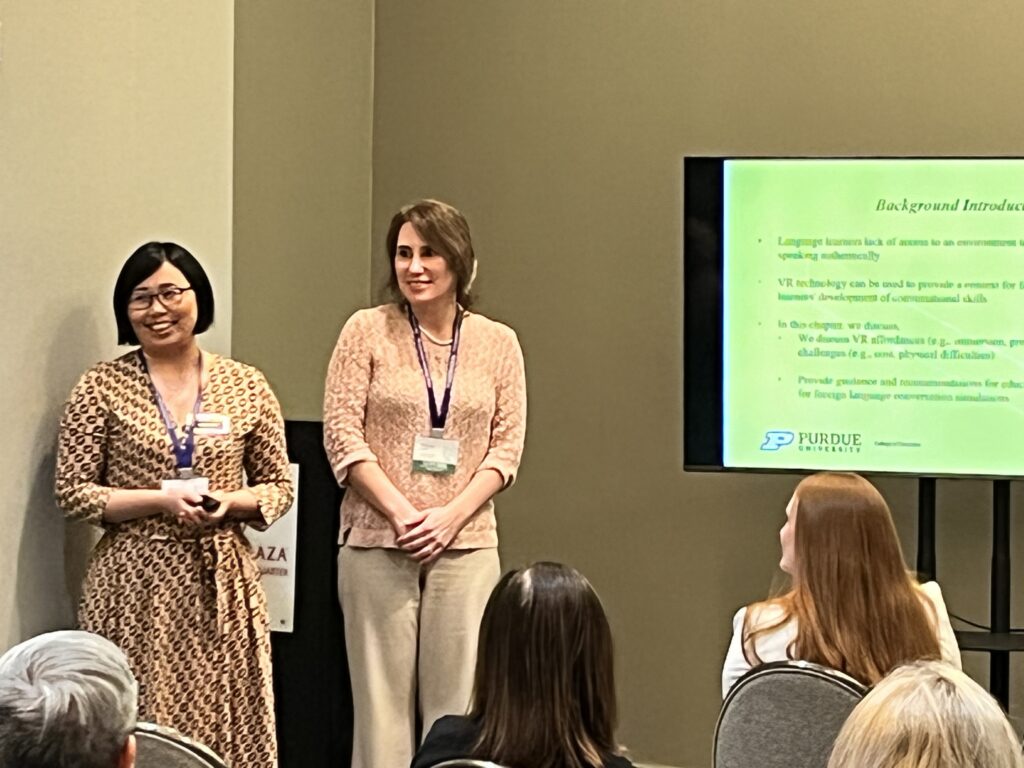
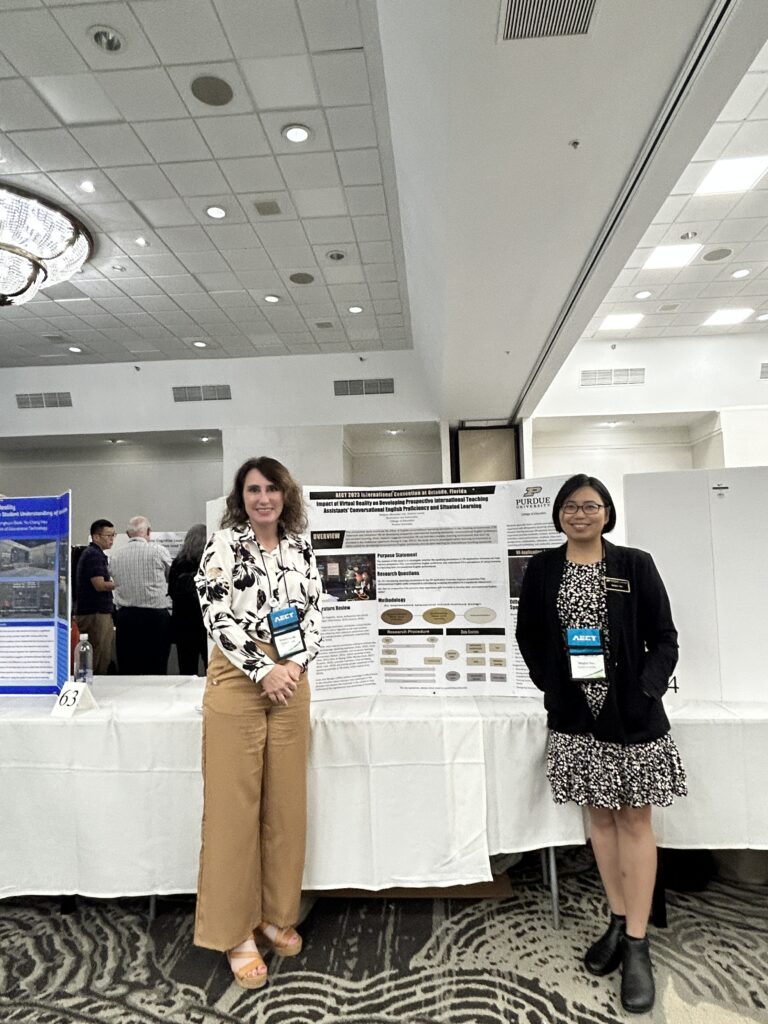
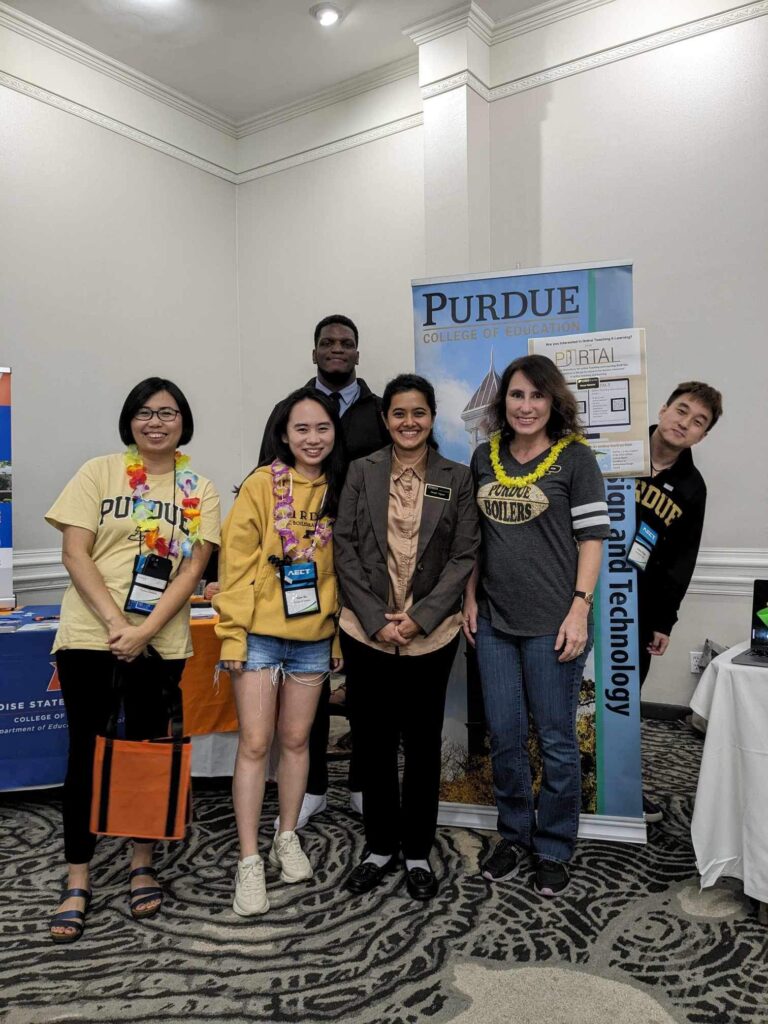
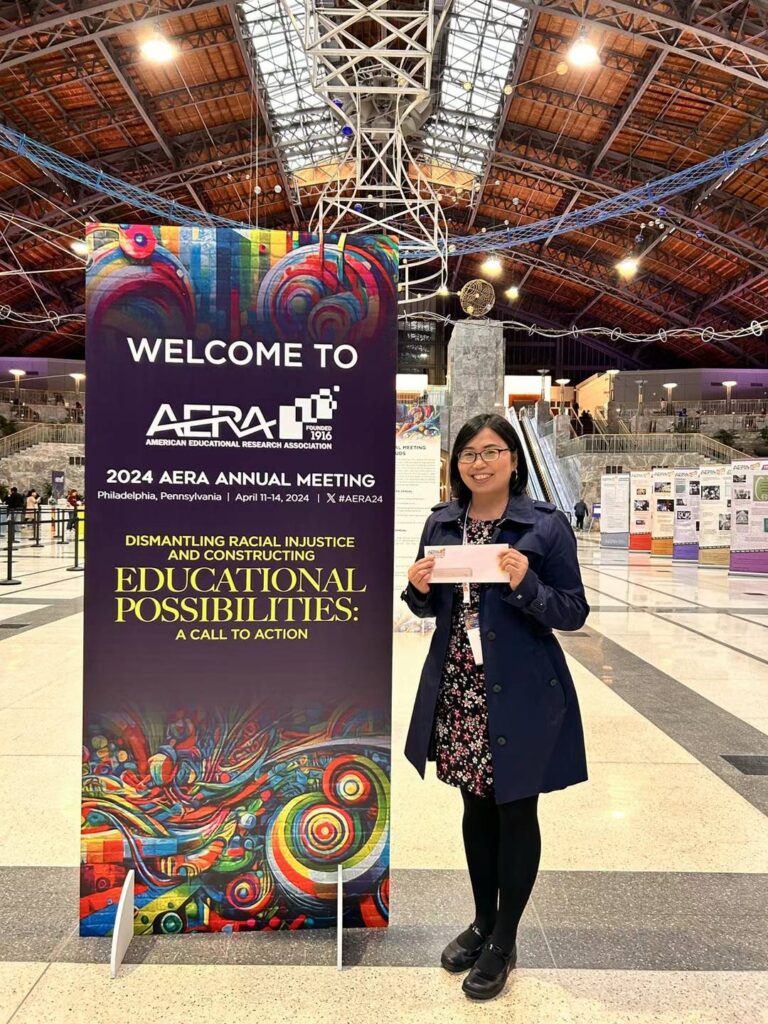
Awards and Honors
2024 “Thumbs up” recipient, Purdue University
2023 Teaching Leadership Award, Purdue Provost’s Office. Project awarded: “Enhancing Instruction Through Integrating Extended Reality (XR) Experiences for Experiential Learning Opportunities.”
2022 Honors Award in the 3-minute-thesis presentation, 16th Annual Graduate Student Education Research Symposium, Purdue University
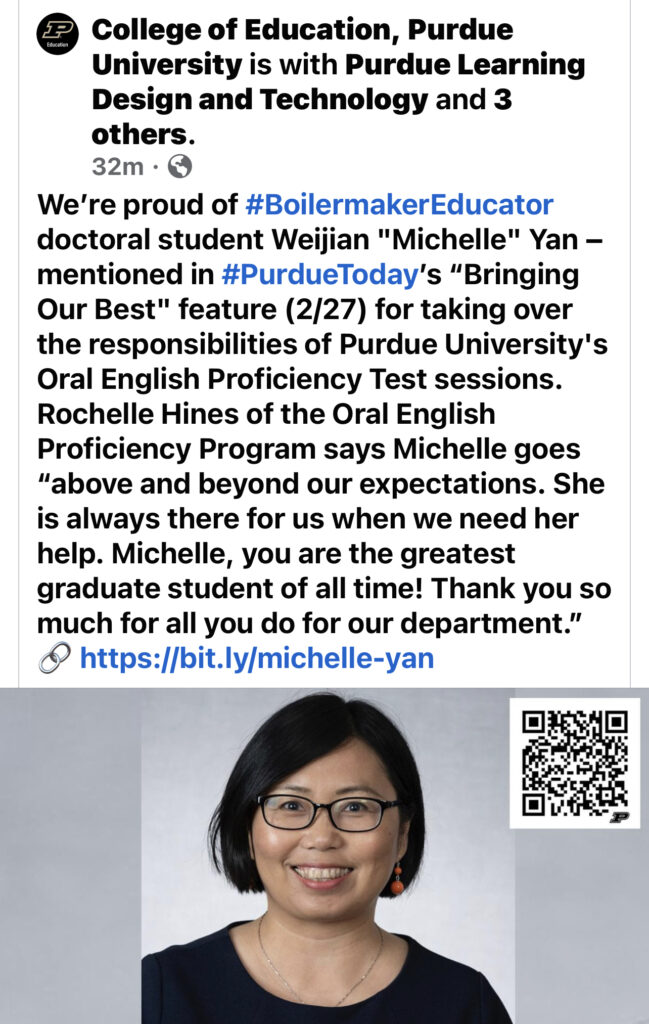
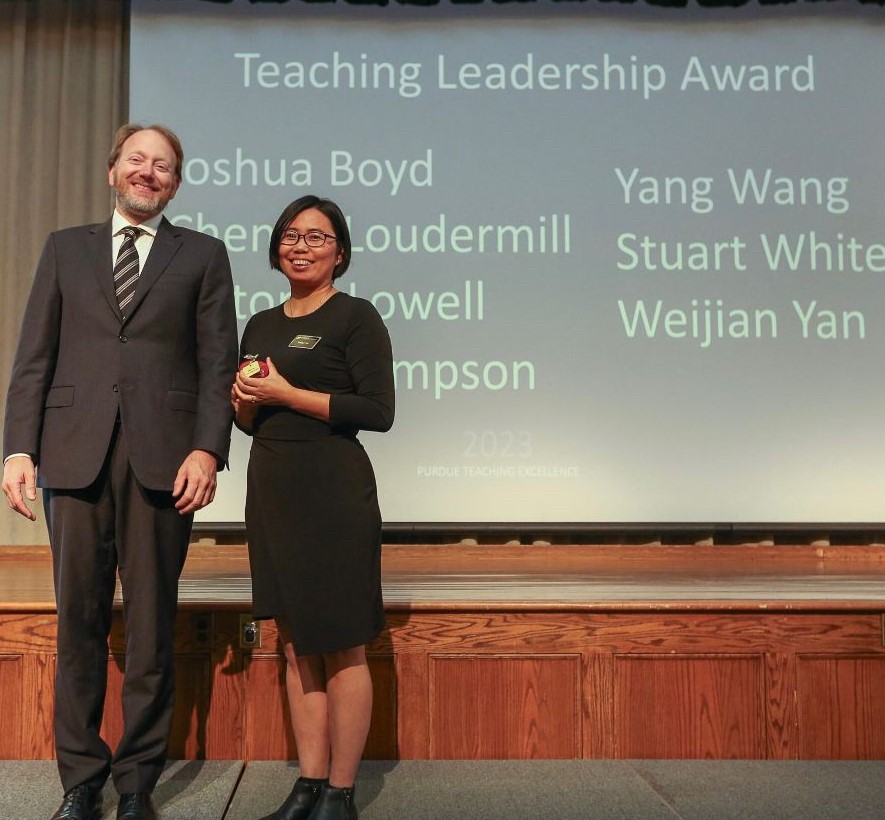
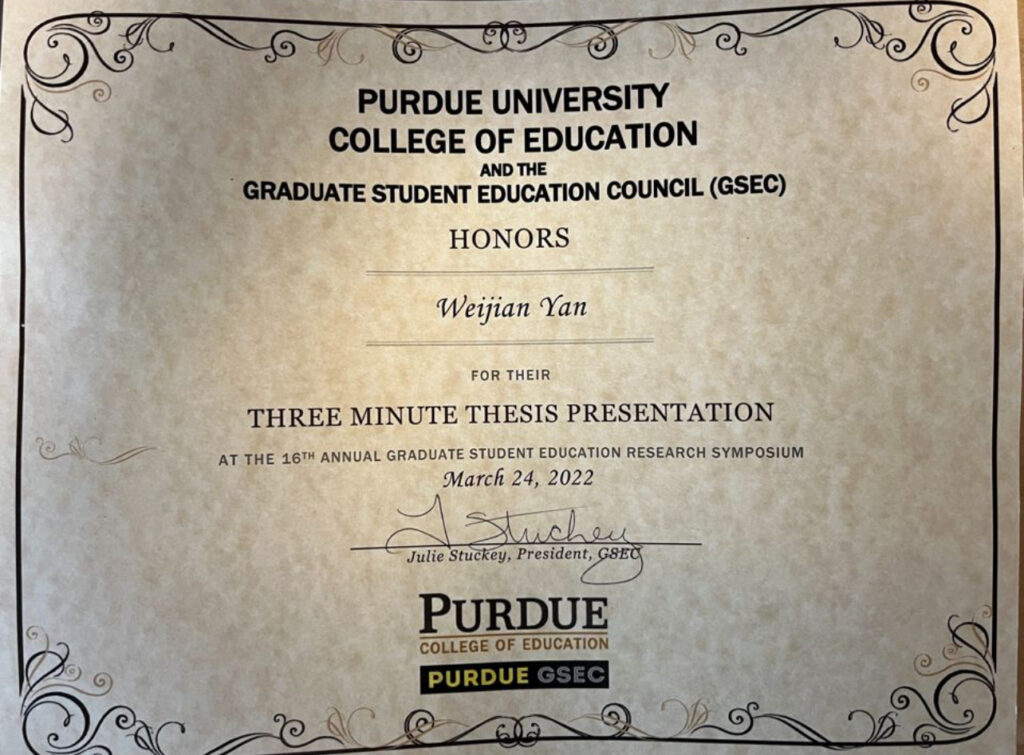
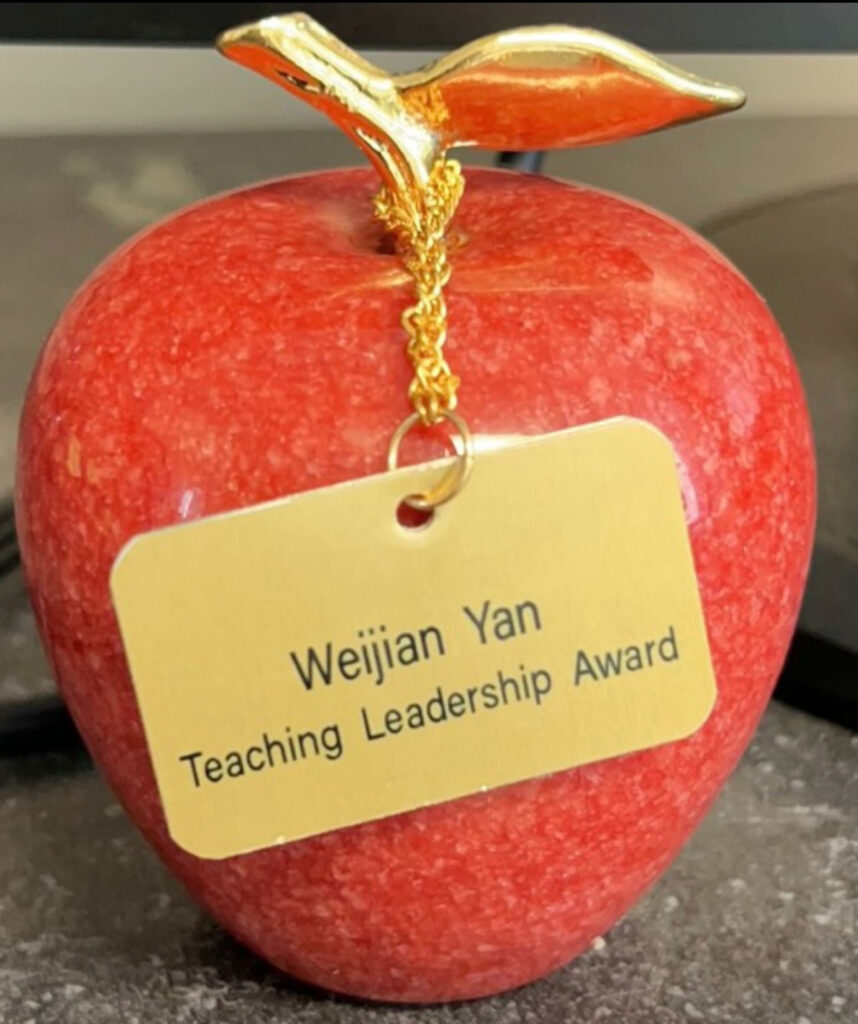
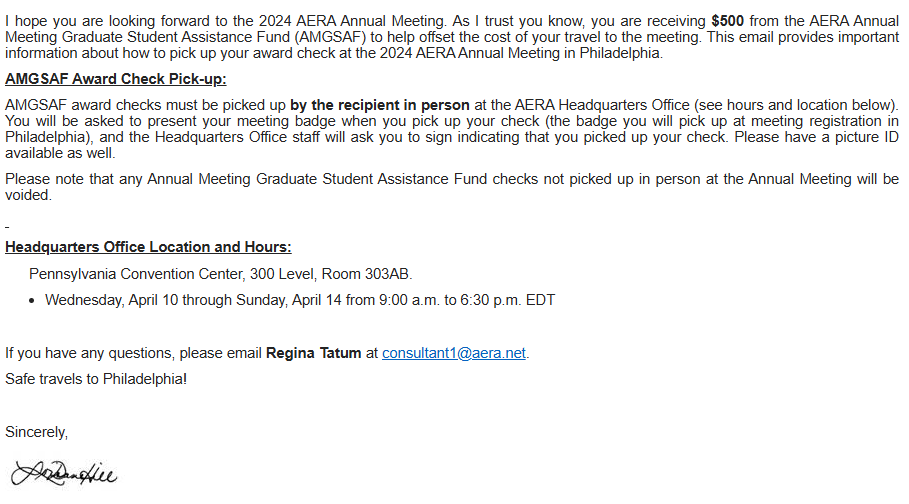
Scholarship
Refereed Journal Articles
1. Lowell, V. L. & Yan, W. (2024). The design of immersive virtual reality (IVR) learning using systems thinking. TechTrends, 68(1), 149-160.
https://doi.org/10.1007/s11528-023-00922-1
Refereed Book Chapters
1. Lowell, V. L., & Yan, W. (2023). Facilitating foreign language conversation simulations in virtual reality for authentic learning. In T. Cherner & A. Fegely (Eds), Bridging the XR technology-to-practice gap: Methods and strategies for blending extended realities into classroom instruction, volume I (pp. 119-133). Association for the Advancement of Computing in Education and Society for Information Technology and Teacher Education. https://www.learntechlib.org/p/222242/
2. White, S. K., Xu, Q., Ilobinso, A. C., Yan, W., Dong, L., Zhang, Z., … & Koehler, A. A. (2024). Empathy-driven instructional design in asynchronous online discussions. In Humanizing Online Teaching and Learning in Higher Education (pp. 91-114). IGI Global. http://doi.org/10.4018/979-8-3693-0762-5.ch005
Work Under Publishing Process
1. Yan, W., & Lowell, V.L. (2024). Design and evaluation of task-based role-play speaking activities in a VR environment for authentic learning: A design-based research approach, Journal of Applied Instructional Design.
Refereed Conference Proceedings
1. Lowell, V. L., & Yan, W. (2023). Bridging the XR technology-to-practice gap: XR presence, communication, and engagement – Chapter: Facilitating foreign language conversation simulations in virtual reality for authentic learning. In Proceedings of Society for Information Technology & Teacher Education (SITE), New Orleans, LA., United States.